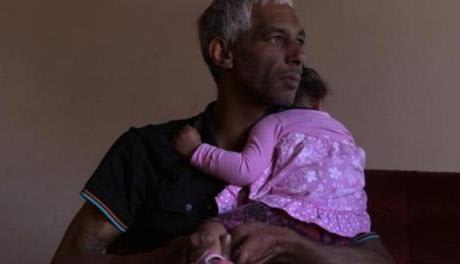Given unprecedented access to the inner workings of a gang operating in the squalor of Cape Flats, South Africa, Riaan Hendricks offers a look into the harrowing life of an aging criminal being forced to re-examine his priorities in life while fighting a vicious turf war.
Intimate, unguarded and very real, The Devil's Lair is tense in ways fiction can't replicate; when you hear gunfire here, the awareness that somebody's life is actually in danger is impossible to escape. And so the viewer shares at least a small measure of discomfiting uncertainty with Braaim's wife of not knowing whether or not her husband will return home each night or whether he'll end up in a hospital or, worse yet, in a body bag like so many of his friends.
Braaim's motivation for allowing Hendricks to film him is never revealed and the documentarian presents his footage plainly, so the movie exists apart from any specifically identifiable intention other than to observe and perhaps humanize a marginalized segment of society whose members are often dismissed as villains or, conversely, glamorized as anti-heroes by the entertainment industry.
The leader of the "Nice to Kill" gang is a family man who fell into the same business his father was in. In his life, there is no separation between plotting gang war strategy and affectionately playing with his two young children. Not merely being a matter of business and domestic duties overlapping, this is an example of work infiltrating almost every aspect of his life.
What Braaim doesn't realize, which Hendricks' documentary uncomfortably illuminates, is that his fear of his children learning to have a casual attitude towards death and violence is already coming true. How even a removed connection to his father's business of treating people like flesh pawns in a human chess game has affected Braaim's son is one of many moments in The Devil's Lair that'll make your blood run cold.
But as chilling as it often is, Hendricks finds the relatable warmth in this second-generation gangster's struggle to be a good father and husband while fulfilling his sense of obligation to his chosen tribe.
(Journeyman PIctures)Intimate, unguarded and very real, The Devil's Lair is tense in ways fiction can't replicate; when you hear gunfire here, the awareness that somebody's life is actually in danger is impossible to escape. And so the viewer shares at least a small measure of discomfiting uncertainty with Braaim's wife of not knowing whether or not her husband will return home each night or whether he'll end up in a hospital or, worse yet, in a body bag like so many of his friends.
Braaim's motivation for allowing Hendricks to film him is never revealed and the documentarian presents his footage plainly, so the movie exists apart from any specifically identifiable intention other than to observe and perhaps humanize a marginalized segment of society whose members are often dismissed as villains or, conversely, glamorized as anti-heroes by the entertainment industry.
The leader of the "Nice to Kill" gang is a family man who fell into the same business his father was in. In his life, there is no separation between plotting gang war strategy and affectionately playing with his two young children. Not merely being a matter of business and domestic duties overlapping, this is an example of work infiltrating almost every aspect of his life.
What Braaim doesn't realize, which Hendricks' documentary uncomfortably illuminates, is that his fear of his children learning to have a casual attitude towards death and violence is already coming true. How even a removed connection to his father's business of treating people like flesh pawns in a human chess game has affected Braaim's son is one of many moments in The Devil's Lair that'll make your blood run cold.
But as chilling as it often is, Hendricks finds the relatable warmth in this second-generation gangster's struggle to be a good father and husband while fulfilling his sense of obligation to his chosen tribe.
